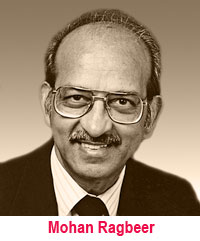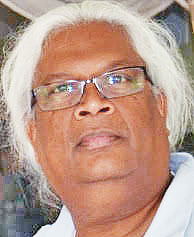Opinions
Of Human Shame

Microfibres are particles ranging in size from microscopic to those barely visible to the naked eye. They come from natural as well as synthetic material, thus from cotton, silk and derivatives to plastics (or polymers) from petro-chemicals. Nylon was the first, developed before WWII by DuPont of the USA and IG Farben of Germany. Its characteristics led to an explosion of similar substances (nearly 400 million tons produced in 2017 and projected to 1800M tons by 2050), and extensive use in almost all industries, now integral to many, from clothing and building materials to printed
circuits and toys. Modern habits and corporate trends suggest that it is not going to stop, or even slow down. Plastics do not degrade readily, some not at all. Recent articles in National Geographic Magazine and Scientific American, two trusted publications (so far), focus on the ubiquity of plastics and their microscopic degradation products, which can be found in the remotest oceans, easy to understand as tides and currents will circulate any suspended or dissolved matter. The problem of plastic waste was the subject of a recent international agreement, the USA declining. To appreciate how serious this is, microscopic particles of indissoluble plastic, have been found in krill and other organisms at the beginning of the food chain. Displacement of regular nutrients will threaten the survival of these micronutrients, reducing the viable population at every level of that chain, from the tiniest visible plankton to the fully grown forms that feed the highest levels of the chain. Micro plastic fibres have been found in human blood and in drinking water, wherever tested.
From industrial to moral pollution, we move to Guyana, where a constitutional crisis threatens the start-up of an economic game-changer, an over-used metaphor, yet the Granger government, ostensibly now illegal, and with the sensitivity of a dead duck, has chosen to honour a convicted felon, which I thought was the sort of thing the Donald would do and boast about! But Granger and his gang are unapologetic, and even defend it as ethical. The gentleman concerned may have been a staunch PNC member, but to honour a wrong-doer goes beyond loyalty to a direct snub of public morals, and gives a green light to everyone in the PNC, already reeking with crooks. Perhaps we’ll see honours showered on Ministers recently demoted for conflicts of interest in awarding lucrative government contracts to spouses!
Thus Guyana espouses a new morality. The Guyanese reputation long ago entered a steady, at times precipitous descent into today’s nadir, a slide that started with Burnham’s forays to seize the Government, beginning openly in 1961 (but planned long before: see his sister, Jessie’s essay “Beware my brother Forbes” written in the later 1950s), when the newly-formed PNC lost its first elections, refused the winning Jagan’s offer of power-sharing, and concocted the infamous X-13 plan to seize power, confident of the support of Police, Constabulary, the CIA and MI5/6, and consolidated by the imposition of a proportional representation form of government (made possible by another of Jagan’s critical failures to heed advice, and his resolve to stick to a Communist agenda), a mistake that a close ally called “incredibly stupid” and left the country!). Jagan again offered Burnham power sharing, with first Nkrumah, then WE Abraham’s intervention, but failed again to recognise the malevolence of Comrade Forbes, even when PNC minions were punching him in the face in his own car, and stoning it as it moved off. That was 1963.
In the following year Indians were forcefully and lethally evicted from Wismar-Christianburg-Mackenzie.
Today, I am ashamed to admit any connection to the Guyanese administration. I cannot sever my connections to the land and people; after all, they were my friends. But I have lost all respect for the political system (rejected from its inception) and for the people who populate it, regardless of their party. Those who shout loudest today in support of democracy are the ones most likely to deny it. People expected President Granger and his Ministers to do the right and decent thing; but only the young or naïve could wish a leopard to change its spots; how could any of the Party brass, PNC or PPP, change from a way of behaving ingrained in them? Of all the leaders since 1953, Jagan was the only one to be trusted with money. Sadly he was too stubborn and stupid to have used his opportunities wisely. And therein lies the root of Guyana’s current degradation.
From industrial to moral pollution, we move to Guyana, where a constitutional crisis threatens the start-up of an economic game-changer, an over-used metaphor, yet the Granger government, ostensibly now illegal, and with the sensitivity of a dead duck, has chosen to honour a convicted felon, which I thought was the sort of thing the Donald would do and boast about! But Granger and his gang are unapologetic, and even defend it as ethical. The gentleman concerned may have been a staunch PNC member, but to honour a wrong-doer goes beyond loyalty to a direct snub of public morals, and gives a green light to everyone in the PNC, already reeking with crooks. Perhaps we’ll see honours showered on Ministers recently demoted for conflicts of interest in awarding lucrative government contracts to spouses!
Thus Guyana espouses a new morality. The Guyanese reputation long ago entered a steady, at times precipitous descent into today’s nadir, a slide that started with Burnham’s forays to seize the Government, beginning openly in 1961 (but planned long before: see his sister, Jessie’s essay “Beware my brother Forbes” written in the later 1950s), when the newly-formed PNC lost its first elections, refused the winning Jagan’s offer of power-sharing, and concocted the infamous X-13 plan to seize power, confident of the support of Police, Constabulary, the CIA and MI5/6, and consolidated by the imposition of a proportional representation form of government (made possible by another of Jagan’s critical failures to heed advice, and his resolve to stick to a Communist agenda), a mistake that a close ally called “incredibly stupid” and left the country!). Jagan again offered Burnham power sharing, with first Nkrumah, then WE Abraham’s intervention, but failed again to recognise the malevolence of Comrade Forbes, even when PNC minions were punching him in the face in his own car, and stoning it as it moved off. That was 1963.
In the following year Indians were forcefully and lethally evicted from Wismar-Christianburg-Mackenzie.
Today, I am ashamed to admit any connection to the Guyanese administration. I cannot sever my connections to the land and people; after all, they were my friends. But I have lost all respect for the political system (rejected from its inception) and for the people who populate it, regardless of their party. Those who shout loudest today in support of democracy are the ones most likely to deny it. People expected President Granger and his Ministers to do the right and decent thing; but only the young or naïve could wish a leopard to change its spots; how could any of the Party brass, PNC or PPP, change from a way of behaving ingrained in them? Of all the leaders since 1953, Jagan was the only one to be trusted with money. Sadly he was too stubborn and stupid to have used his opportunities wisely. And therein lies the root of Guyana’s current degradation.
Forewarning in learning to cast a net
 Romeo Kaseram
Romeo Kaseram
Now his living from the sea was being affected as industry grew in the homeland, our neighbour reporting his fishing net was returning more garbage and less fish with each cast.
But I recall the time when casting a net into the ocean returned a harvest free from the detritus of civilisation. I was a young boy, and those moments were seaside excursions while growing up back home.
These were the times when I was allowed a break from the learning regimen of multiplication tables, and the Janet & John texts, with its distant gaze into
upper-middle class English life. It was a real-life experience in a trip to the seaside with the neighbour’s kids. Our neighbour had a brood, all showing signs of growing into tall, lengthy versions of their father. The boys and girls were gifted with lengthy arms extending into wide wing-spans. It meant they were eminently capable of hurling the net on its circular flight as a lengthy, ascending arc, the cast spinning outwards so it landed far into the oncoming surge. My neighbour was a man with his eyes on the future of his children, with one of his objectives being, literally as well, to teach his children how to fish.
Such a trip meant anticipating tides, which took some groundwork and neighbourly research. The trip to the seashore was not too far away, about a half-an-hour walk. It took us through cane fields, narrow, dirt tracks teeming with young crabs the size of large coins, and then, the revitalising scent of sea-salt, and a restless blue sea, glimpsed through a network of knotted mangrove trees.
For the father to know when to set out meant finding out how the tides “were running”. To gather this information, he sent a son to our front gate to borrow the newspaper that was delivered daily to our house. Filled with the importance as the messenger gathering news on a deciding item for the day’s agenda, the young man would rattle the lock with huge purpose, imitating an adult’s sense of importance.
The rattling always startled the dogs into a rush, sending rows of sharp, bared teeth stampeding to the wire. Snarling and barking vociferously, they would continuously hurl their bodies at the young man, attempting to throw down the solid, iron gate. However, the dogs were ignored, the young man standing a short, safe distance away, with his chest prominently puffed like a preened bird, aloof from the clamour.
His father had sent him out on a “message”, he told me above the din of the barking dogs, with an elevated face, like a town crier preparatory to the announcement of life-changing, breaking news. However, from past experience, right away I knew the young man’s presence at our front gate could mean one of two things.
First, if this was a request for back copies of the newspaper, then it meant his father was thinking of having voluminous reading materials right at hand, preparatory to passing time while sitting in deep contemplation. Even then my young, insightful mind was whispering to me, with its smile coyly covered by a hand, that the neighbour’s request for older copies of the newspaper was indication of a lack of roughage in their recent diet.
Secondly, if it was a request for the day’s newspaper, then this meant the neighbour had no concern about what was happening in the big city. Neither was he seeking out the slow moving and less binding content on the inside pages.
What he was seeking were the reports on the tides, printed daily on Page 2 of the first section. Right away I knew the family was heading out on an excursion, either to the mangroves for a haul of crabs, or on the ocean itself to cast a seine. But not this time, according to the messenger at the gate. This time the entire family was to be taught the elevated artistry of throwing a cast net from the shore.
Here was an opportunity worth indebting the rest of my youthful life to the enslavement of daily chores. The worst of these were sweeping the backyard, scrubbing moss from drains, and bathing the reluctant, annoyed dogs. Our neighbour, being grateful for the generosity of newspapers, whether for meditation or tidal flow, was always willing to take me along.
So it was in early life I was introduced to the art of casting a fishing net. Most of the times I looked on dismayed as it fell heavily into the surge as a knotted ball of twine. However, the neighbour’s children learned rapidly. Soon their casts were helicoptering out to the incoming tide, spinning and extending upwards, then falling into the surge.
A harvest of fish was hauled out of the sea. My two successful casts returned a beer bottle, half-filled with sand, and a side of shoe, torn opened in front at the toes, seemingly laughing at my dismay.
But my neighbour did not laugh. It was a forewarning, the time coming when harvests from the sea would be less with fish.
Such a trip meant anticipating tides, which took some groundwork and neighbourly research. The trip to the seashore was not too far away, about a half-an-hour walk. It took us through cane fields, narrow, dirt tracks teeming with young crabs the size of large coins, and then, the revitalising scent of sea-salt, and a restless blue sea, glimpsed through a network of knotted mangrove trees.
For the father to know when to set out meant finding out how the tides “were running”. To gather this information, he sent a son to our front gate to borrow the newspaper that was delivered daily to our house. Filled with the importance as the messenger gathering news on a deciding item for the day’s agenda, the young man would rattle the lock with huge purpose, imitating an adult’s sense of importance.
The rattling always startled the dogs into a rush, sending rows of sharp, bared teeth stampeding to the wire. Snarling and barking vociferously, they would continuously hurl their bodies at the young man, attempting to throw down the solid, iron gate. However, the dogs were ignored, the young man standing a short, safe distance away, with his chest prominently puffed like a preened bird, aloof from the clamour.
His father had sent him out on a “message”, he told me above the din of the barking dogs, with an elevated face, like a town crier preparatory to the announcement of life-changing, breaking news. However, from past experience, right away I knew the young man’s presence at our front gate could mean one of two things.
First, if this was a request for back copies of the newspaper, then it meant his father was thinking of having voluminous reading materials right at hand, preparatory to passing time while sitting in deep contemplation. Even then my young, insightful mind was whispering to me, with its smile coyly covered by a hand, that the neighbour’s request for older copies of the newspaper was indication of a lack of roughage in their recent diet.
Secondly, if it was a request for the day’s newspaper, then this meant the neighbour had no concern about what was happening in the big city. Neither was he seeking out the slow moving and less binding content on the inside pages.
What he was seeking were the reports on the tides, printed daily on Page 2 of the first section. Right away I knew the family was heading out on an excursion, either to the mangroves for a haul of crabs, or on the ocean itself to cast a seine. But not this time, according to the messenger at the gate. This time the entire family was to be taught the elevated artistry of throwing a cast net from the shore.
Here was an opportunity worth indebting the rest of my youthful life to the enslavement of daily chores. The worst of these were sweeping the backyard, scrubbing moss from drains, and bathing the reluctant, annoyed dogs. Our neighbour, being grateful for the generosity of newspapers, whether for meditation or tidal flow, was always willing to take me along.
So it was in early life I was introduced to the art of casting a fishing net. Most of the times I looked on dismayed as it fell heavily into the surge as a knotted ball of twine. However, the neighbour’s children learned rapidly. Soon their casts were helicoptering out to the incoming tide, spinning and extending upwards, then falling into the surge.
A harvest of fish was hauled out of the sea. My two successful casts returned a beer bottle, half-filled with sand, and a side of shoe, torn opened in front at the toes, seemingly laughing at my dismay.
But my neighbour did not laugh. It was a forewarning, the time coming when harvests from the sea would be less with fish.
